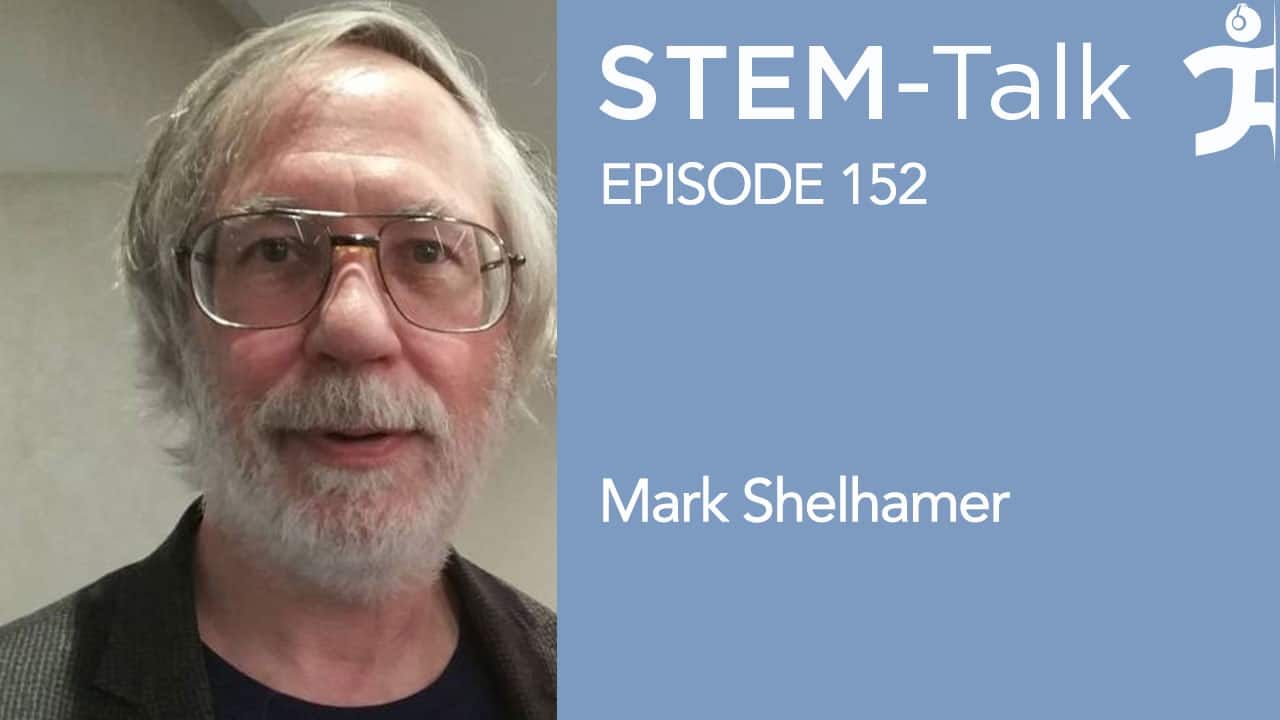STEM-Talk
Episode 152: Mark Shelhamer talks about the effects of spaceflight on humans and NASA’s Planned Mars Mission
// May 16, 2023

Today we have the former chief scientist of NASA’s Human Research Program, Dr. Mark Shelhamer. Mark specializes in neurovestibular adaptation to spaceflight.
He is an otolaryngology professor at Johns Hopkins School of Medicine and the director of the school’s Human Spaceflight Lab. He also the director and founder of the Bioastronautics at Hopkins initiative.
In addition to his work with NASA, Mark is an advisor to the commercial and consumer spaceflight industry. In today’s interview, we talk to Mark about some of this work, as well as the research he conducted on the first all-civilian crew that successfully orbited the Earth for three days in a SpaceX capsule.
We mostly talk to Mark, however, about how the harsh conditions of space imperil humans. We have a fascinating discussion about Mark’s role in NASA’s planned human mission to Mars and how he is investigating ways to maintain the health and performance of astronauts on such a long-duration spaceflight. We also discuss how the lessons Mark is learning about how the lessons of human spaceflight can be applied to healthcare on Earth.
Show notes:
[00:02:42] Dawn starts the interview mentioning that Mark grew up in Philadelphia in the ‘70s. She asks Mark what he was like as a kid. [00:03:32] Dawn asks if it is true that Mark played drums in a band in school. [00:03:54] Ken asks Mark to talk about an uncle who was key in fostering Mark’s interest in math and science. [00:05:31] Ken mentions that Mark was only 10 years old when he took up an interest in electronics and asks what sparked that and what electronics he specifically found interesting. [00:08:14] Dawn mentions that Mark attended Drexel University and initially wanted to become an electrical engineer but changed his mind somewhere along the way. Dawn asks what caused this shift. [00:10:20] Ken asks Mark why he selected to attend MIT after Drexel. [00:13:52] Ken asks Mark how he ended up at Johns Hopkins after finishing his studies at MIT. [00:15:52] Dawn mentions that when Mark arrived at Johns Hopkins as a postdoc fellow in 1990, he continued the research he had been doing at MIT on sensory motor physiology and modeling, including astronaut adaptation to space flight. Dawn asks Mark to give an overview of this research as well as how he tracked back into studying astronauts. [00:17:15] Ken mentions Mark’s 2007 book “Nonlinear Dynamics in Physiology: A State-Space Approach,” which provides mathematical-computational tools for analyzing experimental data. Ken asks Mark to talk about the book and its goals. [00:20:43] Ken mentions that Mark has done quite a bit of research into motion sickness and vestibular issues, and asks about his more recent work on Space Motion Sickness. [00:24:53] Dawn explains that on Mark’s Wikipedia page, there’s a reference to his pioneering work on a multidisciplinary approach to human space flight research. She asks Mark to give an overview of this work. [00:29:17] Dawn explains that spaceflight has widespread effects on many different body systems at the same time, and that Mark has been an advocate for developing approaches to examining all these interactions in a rigorous way. Dawn asks if Mark feels that we should be taking this rigorous multidisciplinary approach and applying it to terrestrial medicine as well. [00:34:08] Ken asks Mark to talk about some of the progress he has made in convincing certain groups that they need to embrace a multidisciplinary approach to their research. [00:38:37] Dawn mentions that getting people, especially groups, to change their approach to research can be a daunting task. She goes on to mention that Mark has been quoted as saying “If there’s one thing I’m known for, it’s banging my head against the wall trying to convince people to do integrative research.” Dawn asks Mark how many scars he has on his forehead from these efforts. [00:43:00] Dawn asks Mark to talk about his informal expertise on the history of NASA’s early stages of human spaceflight. [00:48:54] Dawn explains that we may be on the cusp of another exciting time with NASA’s Artemis program and plans to return to the moon. Dawn also mentions that two years ago, the first all-civilian crew was sent on a 3-day mission orbiting Earth by SpaceX in a Falcon rocket. Dawn explains that there were several research projects related to Inspiration4 and that Mark was the principal investigator for one of them. Dawn asks Mark to talk about this project, which is part of a NASA-supported experiment to test and study astronauts through the year 2033. [00:57:16] Ken points out the success of Apollo 17’s scientific inquiries thanks to Jack Schmitt being a scientist who had the chance to fly the mission as an astronaut. Ken and Mark talk about the importance of having more subject-matter experts go into space so that detailed spontaneous scientific observations can be made. [01:00:16] Dawn mentions that in 2013, Mark took leave from Johns Hopkins to serve as the chief scientist of NASA’s Human Research Program. In this capacity, Mark particularly looked at the effects of space radiation on people as well as the behavioral risks of being confined with a small group of people in tight quarters on a long-duration spaceflight. Dawn asks Mark to talk more about this research. [01:04:43] Mark Ken and Dawn discuss the psychological, mechanical, and physiological pros and cons of artificial gravity for a Mars mission. [01:07:39] Dawn mentions that most human research has been focused on keeping people healthy in space. However, one thing that Mark is excited about is the potential of spaceflight research to enhance terrestrial healthcare. Dawn mentions that not everyone sees the broader scientific value of human spaceflight research. To address this, Mark and a group of colleagues published a paper in 2020 titled, “Selected discoveries from human research in space that are relevant to human health on earth.” Dawn asks Mark to talk about what some of the reservations are that people have about the ability of spaceflight research to enhance terrestrial healthcare. [01:12:23] Ken mentions that this 2020 paper looked at five areas of physiology that support Mark’s contention of the broader implications of spaceflight research. Ken asks Mark to discuss these and their potential relevance to scientific and medical issues on Earth. [01:17:53] Ken starts a dialogue about the assessment of risk for a Mars mission, as well as proposing pharmacological interventions for things like bone loss in long duration space flights. [01:21:03] Ken explains that NASA estimates that it will take around seven months to get to Mars with a good planetary alignment. Ken goes on to explain that NASA is planning to send humans to Mars in the 2030s and asks Mark to give his thoughts about a future Mars Mission and the role that human research might play in enabling such missions. [01:26:08] Dawn explains that in addition to Mark’s NASA work, he also has projects involving SpaceX and Blue Origin, and mentions that he must be very busy at the moment. [01:26:45] Dawn mentions that Elon Musk has gone on record as saying that SpaceX will land humans on Mars by 2026 and asks Mark what his take on this is. [01:28:16] Ken asks if it is true that Mark remains an avid ham radio hobbyist and still plays drums in his spare time. [01:29:32] Dawn mentions that Mark’s high school is so proud of what he has accomplished in his career that last year he was inducted into his high school’s inaugural Hall of Fame class. [01:31:15] Dawn asks if Mark’s previously mentioned connection to the Hubble Space telescope research program is in fact his wife. [01:31:48] Dawn mentions that she has heard that Mark is a cat person and to close the interview asks Mark about that.





